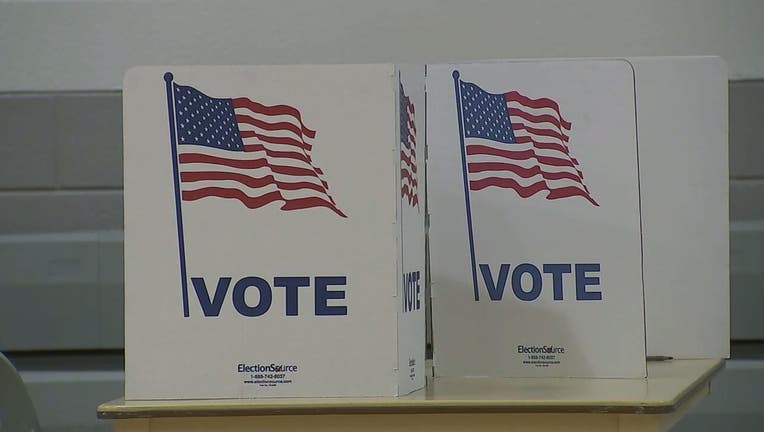Iowa Democratic caucus results delayed amidst 'quality checks', new reporting rules

DES MOINES, Iowa - The Iowa Democratic Party said Monday night that results from the state's first-in-the-nation caucus were delayed due to "quality checks" and new reporting rules, an embarrassing complication that added a new layer of doubt to an already uncertain presidential primary season.
The party said the problem was not a result of a "hack or an intrusion."
The statement came as Iowa voters packed caucus sites across the state with at least four leading candidates battling to win the opening contest of the 2020 campaign, and ultimately, the opportunity to take on President Donald Trump this fall.
Democrats hoped that Iowa's caucuses would provide some clarity for what has been a muddled nomination fight for much of the last year. But apparent technology issues delayed the results as the state party suggested turnout was on track to match 2016 numbers.
Party officials held a call with campaigns as concerns were growing over the delays.
"The integrity of the results is paramount," party spokesperson Mandy McClure said. "We have experienced a delay in the results due to quality checks and the fact that the IDP is reporting out three data sets for the first time."
Des Moines County Democratic Chair Tom Courtney blamed technology issues in his county, relaying precinct reports that the app created for caucus organizers to report results was "a mess." As a result, Courtney said precinct leaders were phoning in results to the state party headquarters, which was too busy to answer their calls in some cases.
Linn County Auditor Joel Miller, who ran a precinct in the Cedar Rapids suburbs, said some app users probably did not get instructions on how to log into the system.
"If people didn't know where to look for the PIN numbers or the precinct numbers, that could slow them down," said Miller, who said that he had no problem using the system to report his precinct's figures.
Meanwhile, Iowa voters were balancing a strong preference for fundamental change with an overwhelming desire to defeat Trump as they sorted through nearly a dozen candidates in a contest that offered the opening test of who and what the party stands for in the turbulent age of Trump. It's just the first in a primary season that will span all 50 states and several U.S. territories, ending only at the party's national convention in mid-July.
For Democrats, the moment was thick with promise for a party that has seized major gains in states since Trump won the White House in 2016. But instead of clear optimism, a cloud of uncertainty and intraparty resentment hung over Monday's election as the prospect of an unclear result raised fears of a long and divisive primary fight in the months ahead.
Before the reporting issues surfaced, candidates fought to rally their supporters.
"I'm the one who can pull our party together," Massachusetts Sen. Elizabeth Warren told supporters on a telephone call before voting began, suggesting her rivals could not. They said they were the ones to bring unity.
One unsurprising development: Trump won the Republican caucus, a largely symbolic victory given that he faced no significant opposition.
Pre-caucus polls suggested that Vermont Sen. Bernie Sanders might have a narrow lead, but any of the top four candidates -- Sanders, former Vice President Joe Biden, Warren and former South Bend, Indiana, Mayor Pete Buttigieg -- could score a victory in Iowa's unpredictable and quirky caucus system as organizers prepared for record turnout. Sen. Amy Klobuchar, who represents neighboring Minnesota, was also claiming momentum, while outsider candidates including entrepreneur Andrew Yang, billionaire activist Tom Steyer and Hawaii Rep. Tulsi Gabbard could be factors.
The past several Democrats who won the Iowa caucuses went on to clinch the party's nomination.
The 2020 fight has played out over myriad distractions, particularly congressional Democrats' push to impeach Trump, which has often overshadowed the primary and effectively pinned several leading candidates to Washington at the pinnacle of the early campaign season.
Meanwhile, ultrabillionaire Mike Bloomberg, the former mayor of New York City, is running a parallel campaign that ignores Iowa as he prepares to pounce on any perceived weaknesses in the field come March.
The amalgam of oddities, including new rules for reporting the already complicated caucus results, was building toward what could be a murky Iowa finale before the race pivots quickly to New Hampshire, which votes just eight days later.
New party rules may give more than one candidate an opportunity to claim victory in Iowa, even if they aren't the official winner.
For the first time, the Iowa Democratic Party reported three sets of results at the end of the state's first-in-the-nation caucuses: a tally of caucus-goers' initial candidate preference; vote totals from the "final alignment" after supporters of lower-ranking candidates were able to make a second choice, and the total number of State Delegate Equivalents each candidate receives.
There is no guarantee that all three will show the same winner.
The Associated Press will declare a winner based on the number of state delegates each candidate wins, which has been the traditional standard.

